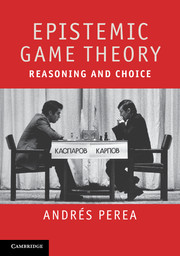Book contents
- Frontmatter
- Contents
- List of figures
- List of tables
- Acknowledgments
- 1 Introduction
- Part I Standard beliefs in static games
- Part II Lexicographic beliefs in static games
- 5 Primary belief in the opponent's rationality
- 6 Respecting the opponent's preferences
- 7 Assuming the opponent's rationality
- Part III Conditional beliefs in dynamic games
- Bibliography
- Index
6 - Respecting the opponent's preferences
Published online by Cambridge University Press: 05 July 2012
- Frontmatter
- Contents
- List of figures
- List of tables
- Acknowledgments
- 1 Introduction
- Part I Standard beliefs in static games
- Part II Lexicographic beliefs in static games
- 5 Primary belief in the opponent's rationality
- 6 Respecting the opponent's preferences
- 7 Assuming the opponent's rationality
- Part III Conditional beliefs in dynamic games
- Bibliography
- Index
Summary
Respecting the opponent's preferences
In the previous chapter we introduced the idea of reasoning cautiously about your opponent. By this we mean that you do not completely discard any of the opponent's choices from consideration, even though you may deem some of the opponent's choices much more likely than others. We have seen that cautious reasoning can be modeled by using lexicographic beliefs to express your thoughts about the opponent's choice. So, instead of representing your belief by a single probability distribution on the opponent's choices – as we did in Part I of this book – we model your belief by various probability distributions – your primary belief, your secondary belief, and so on. To reason cautiously about your opponent then means that all of the opponent's choices should enter somewhere in your lexicographic belief, maybe in your primary belief, or perhaps only in your tertiary belief, or even later.
The key problem we faced in the previous chapter was how to define “belief in the opponent's rationality.” As we discovered, we cannot require you to believe in the opponent's rationality at each level of your lexicographic belief, since this is not possible in general when you reason cautiously. We then opted for a rather weak version of belief in the opponent's rationality, stating that you believe in the opponent's rationality at least in your primary belief. We called this condition primary belief in the opponent's rationality. This condition thus only puts restrictions on your primary belief, but not on your secondary belief and further. So, in a sense, it ignores your secondary and higher beliefs.
- Type
- Chapter
- Information
- Epistemic Game TheoryReasoning and Choice, pp. 250 - 300Publisher: Cambridge University PressPrint publication year: 2012



